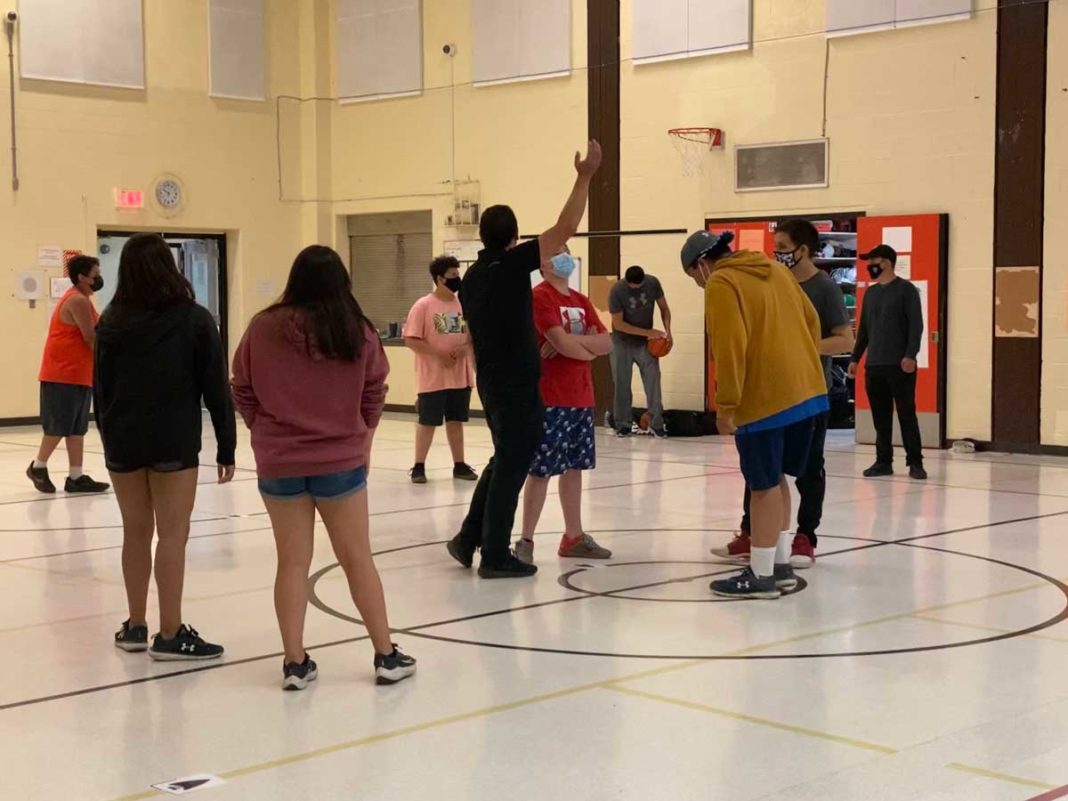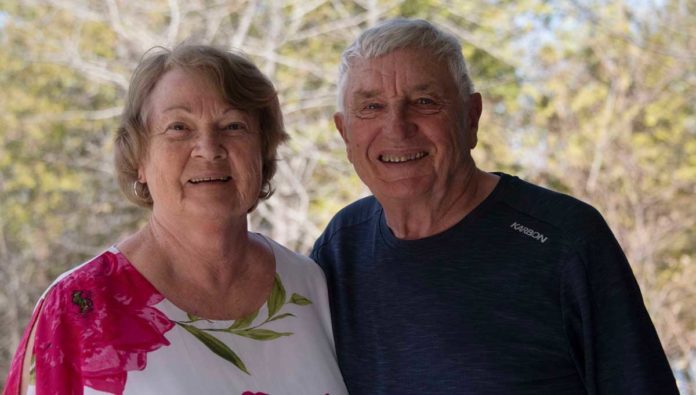UCCM Police pilots citizenship project in schools
M’CHIGEENG—United Chiefs and Councils of Manitoulin (UCCM) Anishinaabe Police Service’s Lighting the Fire Within (LTFW) program is designed to reduce risk factors associated with domestic violence and facilitate the creation of safer, stronger and healthier First Nation communities. Coordinator Faith Beaudin was hired mid-pandemic to implement the program. She’s just completed a successful pilot project at Lakeview School in M’Chigeeng with officers engaging with youth in sports and conversation. The program is unique and will ultimately result in a blueprint for other police forces across Canada.
The LTFW program is a four year pilot project funded through Women and Gender Equality (WAGE) Canada with three main goals: provide training to police service employees that focuses on creating a trauma and culturally responsive approach to victims of domestic violence; delivery of a culturally responsive pre-charge diversion program to individuals who are perpetrators of non-criminal code domestic disputes; and create an interest based program for youth to develop and foster a relationship of trust with the police and to promote healthy relationships.
Ms. Beaudin’s role has been to run with the project implementation plan; she is working on the youth program. Social Navigator Daughness Migwans is working on the diversion program and has already run a successful pilot in one of their service communities. There is an advisory group that includes other sectors as well as victims and people with lived experience who enable us to look at the project through their world view by sharing their experience, Ms. Beaudin explained. “This component helps people with non-criminal offences by looking at what they’ve gone through. We hope the program will get them on another path.”
Taylor Sayers, director of corporate services, is developing the officer training component that will provide culture and trauma influenced training approaches related to domestic violence and sexual assault for officers across the board, whether they are new recruits or have 25 years experience. “The most dangerous crime a police officer can go into is domestic violence and we want to ensure that officers are informed about what they’re going into,” Ms. Beaudin said. “Domestic violence incidents are often fueled by passion and that can make them more violent and more dangerous. Sometimes the partners don’t know what a non-toxic relationship looks like.”
It can go back to what’s going on with residential schools right now, she said. “There is intergenerational trauma that resulted from residential schools and people need to relearn how to have healthy relationships. That ties into teaching young kids how to have healthy relationships. There’s a lot of residual trauma where people attended the residential or day schools that were here.”
Ms. Beaudin’s grandmother was sent to residential school in Spanish. Other members of her family also attended residential or day school. “I’m 25 years old and am the first generation in my family who didn’t have to go,” she said.
“This program is about changing mindsets and promoting a healthier future for young and Indigenous people,” she said. “This program has never been run by any police force in Canada. It’s the first of its kind. Our overall hope is to produce a blueprint for a program that will be available for all police forces in Canada to use. The blueprint can be given to any other police service in Canada and run off the shelf. It’s history in the making if we can successfully run it.”
Ms. Beaudin graduated in October 2020 with a Bachelor of Health Studies from York University; she was hired as LTFW coordinator in September 2020, in the midst of the COVID-19 pandemic. Although her initial connection to the police service dates back to her own participation in UCCM Police programming as a student at Lakeview School, she never thought she would be working in the social work field. “I thought I’d be managing a unit in the hospital or one of the clinics,” she said. She was looking for a job on the Island and spent some time working at Gwekwaadziwin Miikan, where she fell in love with social work.
One of the challenges in developing the pilot has been working from home under COVID-19 guidelines. “All the coordination was done through email, and I could have benefited from physically being in the office for planning,” she acknowledged. Constable Heather Debassige helped coordinate officer participation. “I really only had two weeks to pull it together. Heather was a big asset in that. I don’t know how I could have run it without her.” It took a collaboration of Ms. Beaudin, Constable Debassige and the other officers as well as Lakeview School staff. “We did a lot on the fly. We combined a lot of classes. The teachers were fantastic and worked together to shift their schedules. They all wanted to join our program.”
There were other partners as well. “It’s a collaborative development program,” said Ms. Beaudin. She had input from women with lived and shared experience. Manitoulin Secondary School youth provided some great feedback as did the officers themselves; she also worked with elders and various organizations that have youth programs.
Initially there were concerns as to whether the pilot would run. Ms. Beaudin considered a non-contact version using Zoom that would engage the youth. She also needed to ensure the materials were appropriate for the different age groups and determine if the participants would be receptive. She’s thankful they were allowed to go into the school, especially during COVID-19.
“It was fantastic. It’s so great to see youth engage with our officers. We collaborated with the gym teachers to play the kids favourite game (hunters, a form of dodgeball).”
The in-school pilot worked with classes from Grades 3 through 8. Officers engaged with the students in sports-based activities during the mornings. In the afternoons, students and officers engaged in conversation and art activities in the classroom.
“The kids really enjoyed playing with Constable James Panamick and Constable Joe Naokwegijig on the first day. They talked about healthy relationships. I cannot say enough about Constable Panamick going in there and engaging the Grade 8 class. They were engaged the whole time. He’s a hockey coach also and was just so natural with the class. On other days, Constable Paul Shawanda engaged in outdoor games and talked about heroes. Constable Josh Shokan played hunters and talked about passion. He and the kids had a fantastic time playing the game and then tied the theme of passion into what they were doing,” Ms. Beaudin said. “Constable Debassige played basketball on the final day and finished with a conversation about sportsmanship.”
It was developed as a sports-based (eg. hockey, volleyball and basketball) program with a six- to eight-week duration. “I also though about kids, even officers, who had interests and hobbies that extended further than sports, such as cooking and fishing or drawing,” she added. “I wanted to incorporate more youth so we incorporated an art-based part of the program. Ideally, we want to go in there and keep the kids out of the classroom while engaging them. It ended up going to fruition.”
The program will service all six of the First Nation communities served by UCCM Police. Working in collaboration with each of the communities they can run smaller programs in smaller communities. They also have a mobile unit and can go out to more remote communities and provide the same opportunities the bigger communities receive.
“We heard from some of the teachers,” she said. “The kids would go home and say to their parents, ‘I had a fantastic day working with police. We talked about superheroes or passions’.” She’s happy with the results.
“The question the pilot asked was, ‘can the program be successfully run in school or just as an after school program?’ We’re going to take it to Birch Island’s Shawanosowe School, Lakeview School and St. Joseph’s School in Sheshegwaning. I called the principals and asked if they were interested. I talked to youth workers. Everyone was willing to work with all services.”
Now that the pilot has been successfully completed, there will be some post-pilot analysis and reporting. There are six complete programs ready to roll; eventually there will be over 40. Officers will receive training over the summer. “Training includes a ‘how to’ for using the lesson plans and for officers who have never been in a teaching role there is a quick training on how to engage with youth,” Ms. Beaudin said. “It’s basically a quick ‘how to talk to youth 101’ or ‘top 10 hits,’ as program writer Daniel Stargratt says.” Mr. Stargratt, a former principal at Shawanosowe School, is the program writer Ms. Beaudin has been working with to develop the program.
Roll out of full program activities will begin in September.





